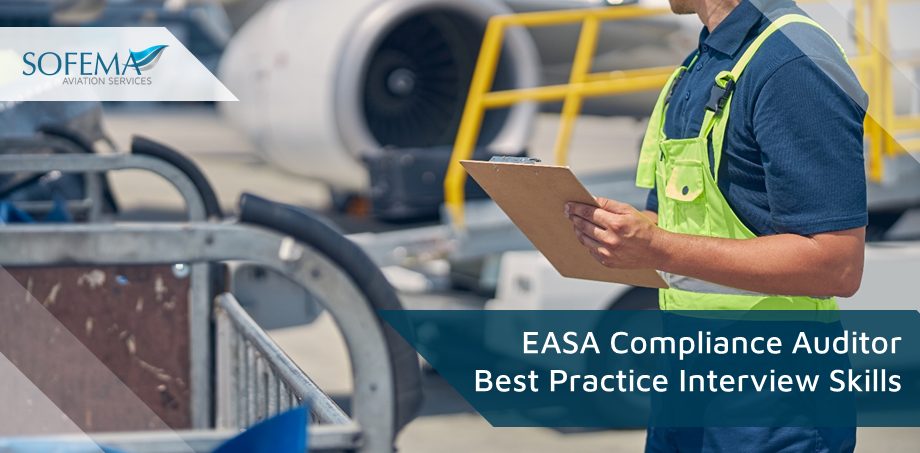Sofema Aviation Services (SAS) www.sassofia.com – considers the key features and best practices needed to gain the maximum from the EASA Compliance Auditor interviews you carry out.
Introduction – Key Features:
- Preparation, ensure you understand the scope of the audit, the areas of focus, and the specific information you need from the interviewee.
- Pay close attention to what the interviewee is saying without immediately formulating a response.
- Focus on asking Open-ended Questions, in this way, you encourage detailed responses which can lead to the maximum possible information.
- Ensure you remain adaptable and be ready to adjust your line of questioning based on the responses you receive.
- Take detailed notes during the interview, or if appropriate, record the conversation (with permission).
Consider the Following Special Points:
- Establish Rapport by starting the interview with light conversation to make the interviewee comfortable.
- As an auditor, you should remain neutral and avoid showing agreement or disagreement with the interviewee’s statements.
- If something is unclear, don’t hesitate to ask for clarification or examples.
- Ensure confidentiality and assure the interviewee that the information shared will remain confidential and will be used solely for audit purposes.
Top Tips to Improve Your Interview Skills:
- Practice Active Listening which means
o Fully concentrating
o Understanding
o Responding, and
o Remembering what the interviewee is saying
- Avoid Leading Questions which can bias the interviewee’s response. Instead, focus on asking neutral questions.
- Use the “Five Whys” Technique which typically involves asking “why” multiple times (usually a maximum of five) to drill down to the root cause of an issue.
- Stay Calm and Professional, which means even if the interviewee becomes defensive or agitated, maintain your composure.
- Follow Up, especially if you realize there’s something you missed or you need further clarification on
- Do schedule a follow-up interview if required
Cautions
- Avoid Assumptions which means do not jump to conclusions based on initial responses. Always Dig deeper to ensure you have the full picture.
- Be Wary of Memory Bias and Remember that people’s recollections can be influenced by various biases.
o If possible, always seek evidence to corroborate statements when necessary.
- Avoid Overwhelming the Interviewee:
o Bombarding the interviewee with too many questions at once can lead to incomplete or rushed answers.
- Respect Boundaries, so that if an interviewee is not comfortable answering a question or sharing certain information, respect their boundaries and do move on.
- Avoid Confrontation, the goal is to gather information, not to accuse or confront. Approach sensitive topics with care.
How to Obtain the Key Facts:
- To achieve a “Structured Approach” Start with general questions and gradually move to more specific ones.
- Always Cross-Reference Information where possible, by comparing the information provided by the interviewee with other data sources to ensure consistency and accuracy.
- Use Probing Questions which delve deeper into topics to uncover underlying issues or details.
- Seek evidences whenever possible, and ask for documents, records, or other forms of evidence to support statements made by the interviewee.
- Summarize and Confirm all the key points discussed during the interview and ask the interviewee to confirm their accuracy.
By honing these skills and being mindful of the tips and cautions, auditors can conduct effective interviews that yield valuable insights for their audits.
Next Steps
Follow this link to our Library to find & Download related documents for Free
Sofema Aviation Services (www.sassofia.com) and Sofema Online (www.sofemaonline.com) provides Classroom, Webinar and Online Training – Please see the websites or email team@sassofia.com for additional information or questions
Tags:
Active Listening, areas of focus, Audit, audit purposes, best practices, EASA Compliance Auditor, interview skills, key points, Library, maximum possible information, Probing Questions, Root Cause, SAS blog, sensitive topics, Structured Approach




